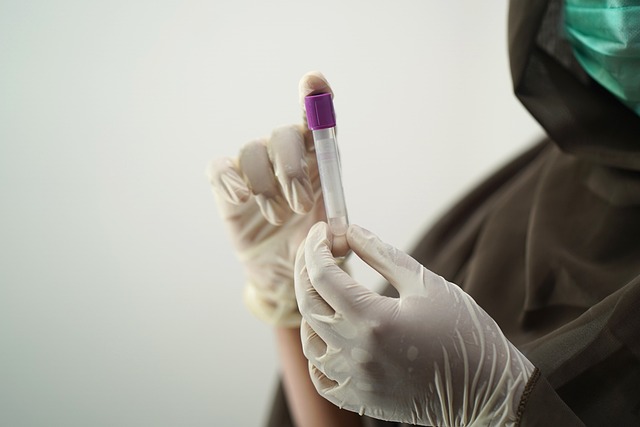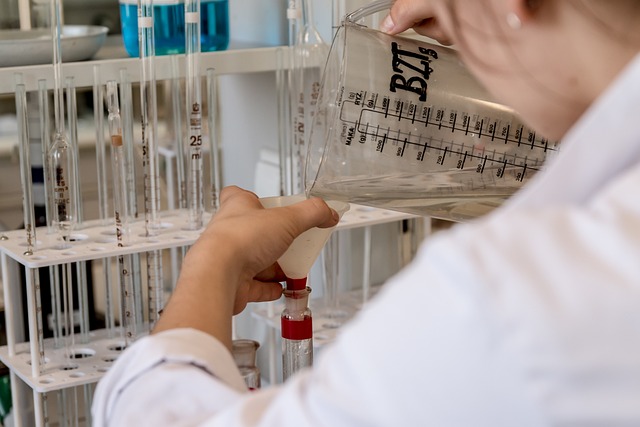The UK Diabetes Blood Test (HbA1c) is a critical diagnostic tool that not only assesses long-term blood sugar levels for diabetes management but also provides insights into male reproductive health. This test helps healthcare providers monitor hormonal balance, particularly testosterone levels, which are fundamental to sexual differentiation, spermatogenesis, and libido in men. It is essential for identifying hormonal imbalances that could lead to infertility or other reproductive health issues like polycystic ovary syndrome (PCOS), which can affect men as well as women. The relationship between androgens and other hormones is pivotal in diagnosing reproductive problems, with blood tests for androgens, LH, and FSH being part of a comprehensive diagnostic approach alongside routine health screenings. These assessments enable early identification of conditions like hypogonadism and facilitate the development of targeted treatment strategies to enhance quality of life. The UK's structured approach to diabetes blood testing, which includes the HbA1c test, serves a dual purpose: it manages diabetes by monitoring glucose levels over time and evaluates male reproductive health by assessing key hormones essential for spermatogenesis and sexual health. This demonstrates the multifaceted importance of the UK Diabetes Blood Test in both diabetes care and maintaining overall reproductive well-being.
Exploring the intricate relationship between male hormones and reproductive health, this article sheds light on the pivotal role of hormone level analysis via UK Diabetes Blood Tests in diagnosing and managing reproductive issues in men. We delve into the scientific underpinnings of hormonal influences, emphasizing the importance of precise blood test measurements as a cornerstone for accurate diagnosis within the UK healthcare system. Join us as we unravel the complexities of male reproductive health through the lens of endocrinology and clinical diagnostics.
- Understanding the Role of Male Hormones in Reproductive Health: An Overview
- The Significance of Blood Test Analysis for Diagnosing Reproductive Issues in Men
- Navigating UK Diabetes Blood Tests as a Tool for Hormone Level Assessment and Reproductive Health Diagnosis
Understanding the Role of Male Hormones in Reproductive Health: An Overview

Male hormones, commonly known as androgens, play a pivotal role in the reproductive health of men. These hormones are integral to male sexual differentiation, spermatogenesis, libido, and overall reproductive function. Androgens, with testosterone being the primary endogenous hormone, regulate various physiological processes that contribute to fertility and virility. In the UK, diagnostic tools such as the Diabetes Blood Test (HbA1c) serve as a non-invasive method to assess overall health, including the impact of diabetes on hormonal balance and reproductive function. This test provides insight into an individual’s average blood glucose levels over the past two to three months, which is crucial for managing conditions that could affect male hormone production and metabolism.
Understanding the interplay between androgens and other hormones, as well as their interaction with various bodily systems, is essential in the context of reproductive health diagnoses. Elevated or imbalanced levels of androgens can lead to a host of issues ranging from infertility to hormone-related conditions such as polycystic ovary syndrome (PCOS), which affects men as well. The diagnostic process often involves a combination of blood tests, including those for male hormones like testosterone, luteinizing hormone (LH), and follicle-stimulating hormone (FSH), along with other routine health screenings. These assessments are critical in identifying underlying causes of reproductive issues and in formulating effective treatment plans to address them.
The Significance of Blood Test Analysis for Diagnosing Reproductive Issues in Men

Male hormone levels, particularly testosterone, are pivotal in reproductive health and overall well-being. In the UK, diagnosing reproductive issues in men often begins with a blood test analysis to measure these hormone levels accurately. This process is significant as it provides clinicians with insights into potential hormonal imbalances that could be affecting fertility or causing other reproductive health concerns. The UK Diabetes Blood Test, which measures various parameters including glucose and HbA1c levels, can also offer indirect indications of hormonal status since diabetes and hormone imbalances can sometimes coexist and influence each other’s diagnosis and management. For instance, testosterone deficiency has been associated with insulin resistance, a characteristic feature of diabetes. Therefore, understanding the interplay between these conditions is crucial for comprehensive healthcare.
The analysis of male hormones through blood tests is a non-invasive method that offers valuable information without the risks associated with more invasive procedures. This diagnostic tool is instrumental in guiding treatment plans for men experiencing symptoms such as decreased libido, infertility, or erectile dysfunction. In the UK’s healthcare system, where early diagnosis and intervention are key to effective management of health conditions, the blood test serves as a foundational step in the evaluation process for reproductive issues. It is a critical first step towards addressing underlying hormonal imbalances, thereby improving the quality of life for affected individuals.
Navigating UK Diabetes Blood Tests as a Tool for Hormone Level Assessment and Reproductive Health Diagnosis

In the UK, diabetes blood tests serve a dual purpose: they manage blood sugar levels for individuals with diabetes and provide a valuable diagnostic tool for assessing hormone levels related to reproductive health. For men seeking to understand potential reproductive issues, these tests can offer insights into hormonal imbalances by measuring key hormones such as follicle-stimulating hormone (FSH), luteinizing hormone (LH), and testosterone. These hormones play pivotal roles in spermatogenesis, sexual health, and overall reproductive function. The process begins with a general practitioner (GP) or endocrinologist who can order specific blood tests to evaluate hormonal profiles. The National Health Service (NHS) provides guidelines for these tests, ensuring standardisation and reliability of the results across different healthcare providers in the UK. Early detection and accurate diagnosis are paramount in managing male reproductive health concerns, and the UK’s structured approach to diabetes blood testing facilitates this by employing consistent protocols and cutting-edge technology. Additionally, these tests can be instrumental in identifying conditions such as hypogonadism or hormonal disorders that may underlie fertility issues, enabling timely interventions and personalised treatment plans. Understanding the nuances of hormone levels through UK diabetes blood tests is crucial for both managing diabetes and addressing reproductive health concerns, thereby highlighting the importance of these tests in maintaining overall health.
In conclusion, male hormones play a pivotal role in reproductive health, and their accurate assessment via UK Diabetes Blood Tests is crucial for diagnosing reproductive issues. The comprehensive analysis of these hormone levels offers valuable insights into the underlying causes of fertility challenges faced by men. By leveraging the standardized procedures of UK Diabetes Blood Tests, healthcare providers can effectively pinpoint and address reproductive health concerns, facilitating personalized treatment plans for male patients. This approach underscores a significant advancement in the diagnostic journey for those experiencing reproductive issues, emphasizing the importance of hormone level analysis as a reliable tool in men’s health diagnosis.
